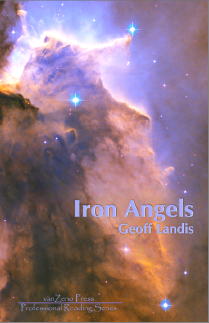
Iron Angels
Page by Geoffrey A. Landis
In the modern imagination, the scientist and the poet stand as opposites, the very embodiments of polarity: the cold of rationality versus the heat of emotion.
I, however --speaking as both a scientist and a poet-- think it would be more accurate to see science and poetry as two aspects of the same human drive.
As a poet and a student of poetry, I've found that one of the most powerful tools of the poet is the metaphor. A metaphor is a comparison of two things which are outwardly unlike, to show some hidden underlying similarity. A poem, more likely than not, compares one thing to another, sometimes explicitly-- Shakespeare comparing a lover to a summer's day; Burns comparing his love to a red red rose--and sometimes symbolically--Frost writing about choosing a path in the woods as a metaphor for the choices we make in life.
But is not science just the search for metaphor? The physicist may say, for example, that the motion of a vibrating string (a violin string, perhaps) is described by a certain equation relating the frequency of vibration to the tension, the mass, and the length of the string. But this is precisely a metaphor; it is a statement that the motion of the string, a real physical object, is "like" the behavior of the mathematical equation, an imaginary construct on paper. --and then having solved that problem, the physicist will go on further, and use that equation to say that the motion of the air in an organ pipe is like that of the vibrating string, and the behavior electromagnetic waves in a vacuum is yet the same, and so on. The vibrating string--and its mathematical image, the harmonic oscillator--is a metaphor used all through physics, right through quantum field theory, and even, yes, superstring theory.
The triumph of science can, if you will, be seen as the discovery of the vast power of the precisely used metaphor. Poets, too--or at least the best poets--are passionately involved in just that search for precision, for a metaphor that is in some sense "exact," the unexpected correlation between two dissimilar things that, the more the reader ponders the connection, the more truth is revealed.
No metaphor, in science or in poetry, is ever truly precise, not even a scientific equation. As all scientists know, the real world is messy and far more complicated than we can ever model. Poets, too, know this. Science, the process, is the search for the limits of validity to what is known, and the extension of the limits a little further into what was previously the realm of chaos.
Science and poetry are alike in other ways as well as in the appreciation for a precise metaphor. Poetry--indeed, all fiction--can be seen as the search for the universal in the personal, much as science can be seen as the search for the universal laws within the restricted environments of the laboratory. Fiction--especially, but not only, science fiction--is an exploration of causality, of the way that events affect other events, the way that our choices make us who we are. So, too, is science an exploration of causality, of the reasons behind events, of the links that make things the way they are.
Science, like poetry, is experience crystallized.
But there is yet something even more fundamental, I think, in the similarity of science and poetry. Science is not merely the search for truth; to a large extent it is also a search for beauty. Nature is endlessly inventive and casually magnificent. Much of the beauty of the universe, of course, you can see without any knowledge of science; who isn't moved by the wild power of a waterfall or the innumerable majesty of the stars, seen far from any city lights? But some of the beauty of nature is hidden away. Who would have expected that the mysterious invisible forces of electricity and magnetism would be related by such a simple yet elegant formulation as the four Maxwell's equations, as intricately intertwined as a sonnet? Who isn't amazed by the complexity of the interrelationship of the myriad living things that form an ecology?
Don't let anybody tell you otherwise: science is not cold.
Science tries to express truth in the minimum number of words. A clumsy theory has too many variables; it is not "elegant." This is not some abstract aesthetic of scientists, though; nature is extravagant, but never superfluous, and a scientific theory should be the same. Likewise a poet who uses five words to say what two could say as precisely is clumsy, verbose and also--like as not--unread.
So, why should science, and even science fiction, not be a fit and fertile subject for poetry? The answer is simple: it should be, and what's more, it is. If anybody should doubt, the poems in this collection go a long way toward proving that point.
So don't let take up any more of your time talking about science and poetry, when you can go read it and, in the true scientific method, discover it for yourself.

Page by Geoffrey A. Landis